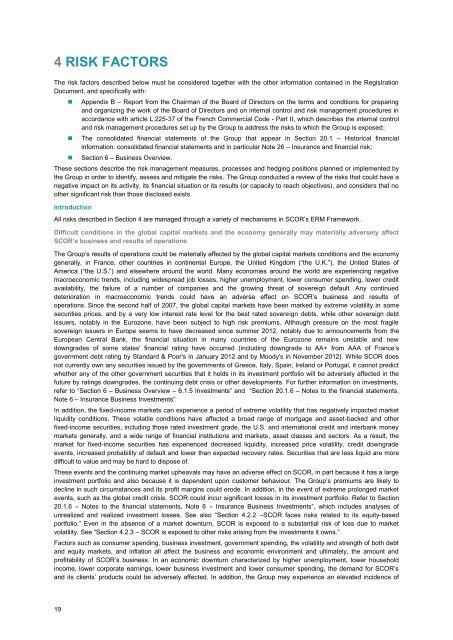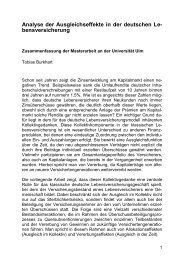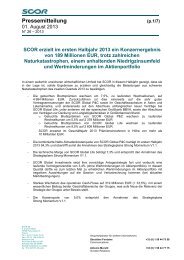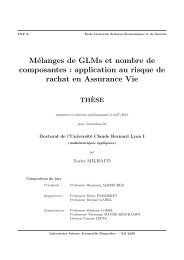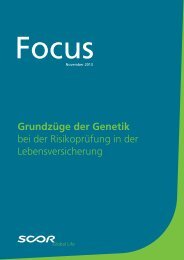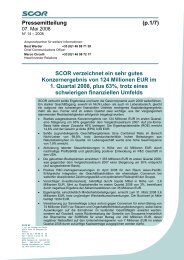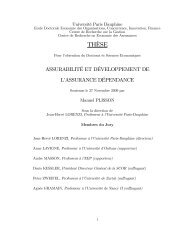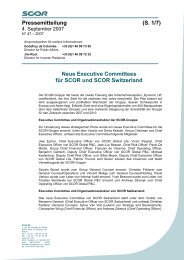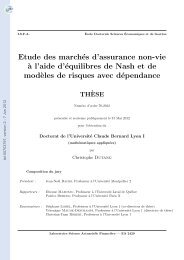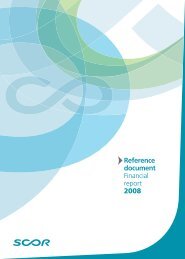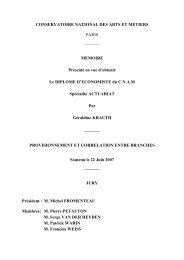4.4 Legal risk - Scor
4.4 Legal risk - Scor
4.4 Legal risk - Scor
Create successful ePaper yourself
Turn your PDF publications into a flip-book with our unique Google optimized e-Paper software.
4 RISK FACTORS<br />
The <strong>risk</strong> factors described below must be considered together with the other information contained in the Registration<br />
Document, and specifically with:<br />
• Appendix B – Report from the Chairman of the Board of Directors on the terms and conditions for preparing<br />
and organizing the work of the Board of Directors and on internal control and <strong>risk</strong> management procedures in<br />
accordance with article L.225-37 of the French Commercial Code - Part II, which describes the internal control<br />
and <strong>risk</strong> management procedures set up by the Group to address the <strong>risk</strong>s to which the Group is exposed;<br />
• The consolidated financial statements of the Group that appear in Section 20.1 – Historical financial<br />
information: consolidated financial statements and in particular Note 26 – Insurance and financial <strong>risk</strong>;<br />
• Section 6 – Business Overview.<br />
These sections describe the <strong>risk</strong> management measures, processes and hedging positions planned or implemented by<br />
the Group in order to identify, assess and mitigate the <strong>risk</strong>s. The Group conducted a review of the <strong>risk</strong>s that could have a<br />
negative impact on its activity, its financial situation or its results (or capacity to reach objectives), and considers that no<br />
other significant <strong>risk</strong> than those disclosed exists.<br />
Introduction<br />
All <strong>risk</strong>s described in Section 4 are managed through a variety of mechanisms in SCOR’s ERM Framework.<br />
Difficult conditions in the global capital markets and the economy generally may materially adversely affect<br />
SCOR’s business and results of operations<br />
The Group’s results of operations could be materially affected by the global capital markets conditions and the economy<br />
generally, in France, other countries in continental Europe, the United Kingdom (“the U.K.”), the United States of<br />
America (“the U.S.”) and elsewhere around the world. Many economies around the world are experiencing negative<br />
macroeconomic trends, including widespread job losses, higher unemployment, lower consumer spending, lower credit<br />
availability, the failure of a number of companies and the growing threat of sovereign default. Any continued<br />
deterioration in macroeconomic trends could have an adverse effect on SCOR’s business and results of<br />
operations. Since the second half of 2007, the global capital markets have been marked by extreme volatility in some<br />
securities prices, and by a very low interest rate level for the best rated sovereign debts, while other sovereign debt<br />
issuers, notably in the Eurozone, have been subject to high <strong>risk</strong> premiums. Although pressure on the most fragile<br />
sovereign issuers in Europe seems to have decreased since summer 2012, notably due to announcements from the<br />
European Central Bank, the financial situation in many countries of the Eurozone remains unstable and new<br />
downgrades of some states' financial rating have occurred (including downgrade to AA+ from AAA of France’s<br />
government debt rating by Standard & Poor's in January 2012 and by Moody's in November 2012). While SCOR does<br />
not currently own any securities issued by the governments of Greece, Italy, Spain, Ireland or Portugal, it cannot predict<br />
whether any of the other government securities that it holds in its investment portfolio will be adversely affected in the<br />
future by ratings downgrades, the continuing debt crisis or other developments. For further information on investments,<br />
refer to “Section 6 – Business Overview – 6.1.5 Investments” and “Section 20.1.6 – Notes to the financial statements,<br />
Note 6 – Insurance Business Investments”<br />
In addition, the fixed-income markets can experience a period of extreme volatility that has negatively impacted market<br />
liquidity conditions. These volatile conditions have affected a broad range of mortgage and asset-backed and other<br />
fixed-income securities, including those rated investment grade, the U.S. and international credit and interbank money<br />
markets generally, and a wide range of financial institutions and markets, asset classes and sectors. As a result, the<br />
market for fixed-income securities has experienced decreased liquidity, increased price volatility, credit downgrade<br />
events, increased probability of default and lower than expected recovery rates. Securities that are less liquid are more<br />
difficult to value and may be hard to dispose of.<br />
These events and the continuing market upheavals may have an adverse effect on SCOR, in part because it has a large<br />
investment portfolio and also because it is dependent upon customer behaviour. The Group’s premiums are likely to<br />
decline in such circumstances and its profit margins could erode. In addition, in the event of extreme prolonged market<br />
events, such as the global credit crisis, SCOR could incur significant losses in its investment portfolio. Refer to Section<br />
20.1.6 – Notes to the financial statements, Note 6 – Insurance Business Investments”, which includes analyses of<br />
unrealized and realized investment losses. See also “Section 4.2.2 –SCOR faces <strong>risk</strong>s related to its equity-based<br />
portfolio.” Even in the absence of a market downturn, SCOR is exposed to a substantial <strong>risk</strong> of loss due to market<br />
volatility. See “Section 4.2.3 – SCOR is exposed to other <strong>risk</strong>s arising from the investments it owns.”<br />
Factors such as consumer spending, business investment, government spending, the volatility and strength of both debt<br />
and equity markets, and inflation all affect the business and economic environment and ultimately, the amount and<br />
profitability of SCOR’s business. In an economic downturn characterized by higher unemployment, lower household<br />
income, lower corporate earnings, lower business investment and lower consumer spending, the demand for SCOR’s<br />
and its clients’ products could be adversely affected. In addition, the Group may experience an elevated incidence of<br />
19


